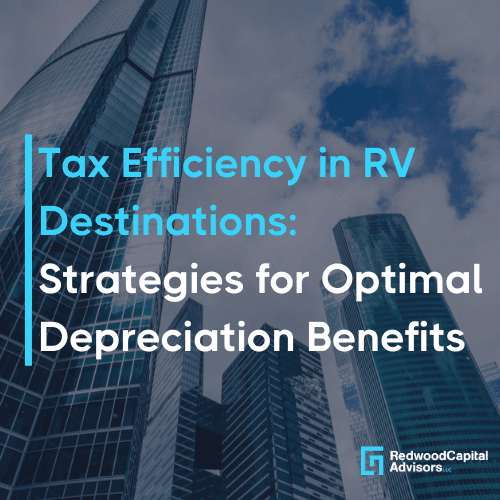Investing in Recreational Vehicle (RV) destinations can be more than just a venture into the hospitality industry; it can also be a savvy tax strategy. The Tax Cuts and Jobs Act of 2017 has revolutionized the tax landscape, especially for RV destination owners. This article delves into the various tax benefits and strategies for accelerated depreciation that can significantly enhance your return on investment.
Understanding Depreciation in RV Destinations
Depreciation is an accounting method used to allocate the cost of tangible assets over their useful lives. For RV destinations, this includes buildings, equipment, and land improvements. It’s a way to recover the cost of an asset over the time it’s used.
Accelerated Depreciation: A Game Changer
Accelerated depreciation methods, such as bonus depreciation and Section 179 expensing, allow businesses to write off a larger portion of an asset’s cost in the early years of its life. This front-loading of expenses can lead to significant tax savings.
Key Depreciation Strategies for RV Destinations
1. Bonus Depreciation Benefits
Under the current tax law, businesses can take 100% bonus depreciation on qualified property in the year it’s placed in service. This is a massive boost, as it allows for the full depreciation of new or used property, excluding the land, in the first year itself.
2. Section 179 Expensing
Section 179 allows businesses to deduct the full purchase price of qualifying equipment or software acquired during the tax year. For 2022, the cap is at $1,050,000, subject to inflation adjustments in subsequent years.
3. Componentization: Maximizing Depreciation
RV destinations often include various assets like utilities, roads, landscaping, and amenities. By segregating these components and depreciating them over their respective lifespans, owners can optimize their depreciation benefits.
4. Operational Asset Depreciation
Operational assets within RV destinations, such as computers, software, and maintenance equipment, are also eligible for rapid depreciation, sometimes even in the first year.
Strategic Implications and Operational Considerations
Enhancing Investment Appeal
The depreciation benefits available to RV destination owners can significantly reduce tax liability, thereby enhancing the after-tax Internal Rate of Return (IRR). This makes such investments more appealing to potential investors and partners, aiding in syndication efforts.
Operational Efficiency
Incorporating these tax strategies not only aids in financial management but also in operational efficiency. By understanding the full scope of tax benefits, RV destination owners can make more informed decisions about asset purchases and improvements.
Practical Example: Maximizing Tax Efficiency
Consider an RV destination purchased for $1,000,000, with the costs broken down as follows:
Land: $300,000 (non-depreciable)
Buildings and Permanent Structures: $400,000
Amenities and Equipment: $300,000
While land is non-depreciable, the buildings, amenities, and equipment present significant opportunities for depreciation. Using 100% bonus depreciation, 30% of the total cost can be depreciated in the first year for amenities and equipment, offering a substantial tax benefit.
Conclusion
The path to maximizing your RV destination investment doesn’t just lie in attracting guests; it’s also in navigating the tax landscape efficiently. Understanding and applying these tax strategies can lead to significant financial benefits, making your investment in RV destinations not only a journey into hospitality but also a journey into savvy financial management.



